Published publications:
Overview of the application of the Charter of Fundamental Rights of the European Union in the Slovak Republic. What is its contribution in practice?

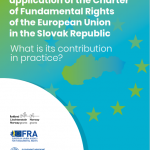 Overview of the application of the Charter of Fundamental Rights of the European Union in the Slovak Republic. What is its contribution in practice? (available for download – pdf, 462 KB)
Overview of the application of the Charter of Fundamental Rights of the European Union in the Slovak Republic. What is its contribution in practice? (available for download – pdf, 462 KB)
The aim of this publication is to guide the reader in a clear way through how the
Charter is applied in the Slovak Republic and how it benefits the holders of the fundamental rights it contains.
The contribution of the Charter is illustrated in particular by presenting real examples from practice where the Court
of Justice of the European Union (“CJEU”) has granted protection of fundamental
rights through direct application of the Charter at the national level. It also introduces a practical set of control questions to assess the compliance of national measures with the Charter. A special space is devoted to the issue of EU funds, since in the current programming period their use is linked to the condition of respecting the fundamental rights in the Charter.
Overview of the application of the Charter of Fundamental Rights of the European Union in the Slovak Republic. What is its contribution in practice? (in slovak language)

 Prehľad o aplikácii Charty základných práv EÚ v Slovenskej republike. Aký je jej prínos v praxi? (dostupné na stiahnutie – pdf, 2 MB)
Prehľad o aplikácii Charty základných práv EÚ v Slovenskej republike. Aký je jej prínos v praxi? (dostupné na stiahnutie – pdf, 2 MB)
Cieľom tejto publikácie je prehľadným spôsobom previesť čitateľa tým, ako sa Charta aplikuje v podmienkach Slovenskej republiky a aký má prínos pre nositeľov základných práv, ktoré obsahuje.
Publikácia sa v úvode zameriava na teoretické základy aplikácie a implementácie Chaty. Prínos Charty je ilustrovaný najmä prostredníctvom priblíženia skutočných príkladov z praxe, kedy Súdny dvor Európskej únie (ďalej len „SDEÚ“) priznal ochranu základným právam priamou aplikáciou Charty na vnútroštátnej úrovni. Prináša aj praktický súbor kontrolných otázok na posúdenie súladu vnútroštátnych opatrení s Chartou. Osobitný priestor je venovaný problematike fondov EÚ, nakoľko v súčasnom programovom období je ich čerpanie naviazané na podmienku dodržiavania základných práv v Charte.
Institutional Structure for the Protection of Fundamental Human Rights at the National Level – Slovakia

 Institutional Structure for the Protection of Fundamental Human Rights at the National Level – Slovakia (available for download – pdf, 3 MB)
Institutional Structure for the Protection of Fundamental Human Rights at the National Level – Slovakia (available for download – pdf, 3 MB)
The study analyses the institutional structure of the protection of human rights in the Slovak Republic through an analysis of the mandates of individual national institutions and public authorities.
In the Slovak Republic, every single public authority is obliged to implement human rights. Thus, a comprehensive picture of the structure of fundamental rights protection in the Slovak Republic encompasses institutions independent of the state whose primary mission is to protect fundamental rights and freedoms, public authorities to which the law explicitly entrusts competences in the field of human rights, public authorities and institutions that ensure the protection of fundamental rights within their specific mandate, and governmental advisory bodies whose role is to promote various policies related to human rights in the state policy.
The Study also provides information on procedures through which an individual can approach these institutions or public authorities. A key strategic document in the field of fundamental rights protection, namely the National Strategy for the Protection and Promotion of Human Rights is also considered. The Study concludes with a final analysis of the nature of the mandate of national institutions within the human rights protection architecture and provides concluding recommendations for these institutions.
Institutional Structure for the Protection of Fundamental Human Rights at the National Level – Slovakia (in Slovak language)

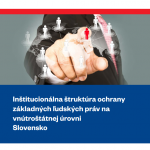 Inštitucionálna štruktúra ochrany základných ľudských práv na vnútroštátnej úrovni (dostupné na stiahnutie – pdf, 2 MB)
Inštitucionálna štruktúra ochrany základných ľudských práv na vnútroštátnej úrovni (dostupné na stiahnutie – pdf, 2 MB)
Štúdia analyzuje inštitucionálnu štruktúru ochrany ľudských práv v Slovenskej republike prostredníctvom analýzy mandátov jednotlivých vnútroštátnych inštitúcií a orgánov verejnej moci.
V podmienkach Slovenskej republiky, každý jeden orgán verejnej moci je povinný reálne uplatňovať ľudské práva. Komplexný obraz o štruktúre ochrany základných práv v Slovenskej republike teda v sebe zahŕňa od štátu nezávislé inštitúcie, ktorých primárnym poslaním je ochrana základných práv a slobôd, orgány verejnej moci, ktorým zákon výslovne zveruje kompetencie v oblasti ľudských práv, orgány verejnej moci a inštitúcie, ktoré zabezpečujú ochranu základných práv v rámci určitého mandátu a poradné orgány vlády, ktorých úlohou je presadzovať do štátnej politiky rôzne politiky, spojené s ľudskými právami.
Štúdia taktiež prináša informácie akým spôsobom sa jednotlivec môže obrátiť na tieto inštitúcie či orgány verejnej moci. Priestor je venovaný aj kľúčovému strategickému dokumentu v oblasti ochrany základných práv, a to konkrétne Celoštátnej stratégii ochrany a podpory ľudských práv. V závere sa štúdia venuje analýze charakteru mandátu vnútroštátnych inštitúcií v rámci štruktúry ochrany ľudských práv a záverečným odporúčaniam pre tieto inštitúcie.
The role of national bodies with a human rights remit in ensuring fundamental rights compliance of EU funds – Slovakia

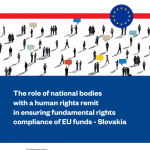 The role of national bodies with a human rights remit in ensuring fundamental rights compliance of EU funds – Slovakia (available for download – pdf, 1 MB)
The role of national bodies with a human rights remit in ensuring fundamental rights compliance of EU funds – Slovakia (available for download – pdf, 1 MB)
As part of the project, the Centre prepared a Report on the role of national human rights institutions in ensuring respect for fundamental rights in the implementation of EU funds in Slovakia. By adoption of the new Common Provisions Regulation for the implementation of EU funds (“Common Provisions Regulation”),1 respect for fundamental rights has now become an essential condition for the implementation of EU funds.
The report focuses on the potential role of the Centre in implementing the fundamental rights conditionality, based on an analysis of the structure of the implementation of European Union funds in the Slovak Republic. The aim of the report is therefore to examine the role that the Centre could play in fulfilling its mandate as a national human rights institution in the process of implementing EU funds respecting the new human rights conditionality.
Concerning the methodology and the scope, the purpose of the report is to provide an overview of how EU funds operate in a national context, in order to identify fundamental rights challenges and opportunities, and to examine the role and involvement of national authorities with human rights remit in ensuring that EU funds comply with fundamental rights.
Based on the results of its desk research, the Centre also identified key stakeholders and experts at national level and conducted expert interviews to obtain an overview of fundamental rights challenges and opportunities in the implementation of EU funds, and to further explore the role of national authorities with human rights remit in ensuring respect for fundamental rights when implanting EU funds.
In preparing the Report, the Centre interviewed:
- the relevant departments of the Ministry of Labour, Social Affairs and Family – the Gestor of the Horizontal Principles which has been mandated to ensure compliance of EU funds with the basic horizontal conditions regarding compliance with the Charter of Fundamental Rights of the European Union and the UN Convention on the Rights of Persons with Disabilities,
- the Office of the Government Plenipotentiary for Roma Communities, which acts as one of the ten intermediate bodies,
- Ministry of Education, Science, Research and Sport of the Slovak Republic, which acts as one of the ten intermediate bodies as well,
- Ministry of Investments, Regional Development and Informatization of the Slovak Republic, which acts as the managing authority.
The role of national bodies with a human rights remit in ensuring fundamental rights compliance of EU funds – Slovakia (in Slovak language)

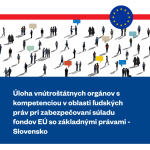 Úloha vnútroštátnych orgánov s kompetenciou v oblasti ľudských práv pri zabezpečovaní súladu fondov EÚ so základnými právami – Slovensko (dostupné na stiahnutie – pdf, 1 MB)
Úloha vnútroštátnych orgánov s kompetenciou v oblasti ľudských práv pri zabezpečovaní súladu fondov EÚ so základnými právami – Slovensko (dostupné na stiahnutie – pdf, 1 MB)
Správa je zameraná na potenciálnu úlohu SNSĽP pri implementácii podmienky dodržiavania základných práv, na základe analýzy štruktúry implementácie fondov Európskej únie v Slovenskej republike. Cieľom správy je preskúmať úlohu, ktorú by SNSĽP pri plnení svojho mandátu vnútroštátnej inštitúcie pre ľudské práva mohlo zohrávať v postupe implementácie fondov EÚ rešpektujúc novú ľudskoprávnu podmienenosť.
Čo sa týka metodiky a rozsahu, účelom Správy je poskytnúť prehľad o tom, ako finančné prostriedky EÚ fungujú vo vnútroštátnom kontexte, identifikovať výzvy a príležitosti v oblasti základných práv a preskúmať úlohu a zapojenie vnútroštátnych orgánov s právomocou v oblasti ľudských práv pri zabezpečovaní súladu finančných prostriedkov EÚ so základnými právami.
Na základe výsledkov teoretického výskumu SNSĽP taktiež identifikovalo kľúčové zainteresované strany a odborníkov na vnútroštátnej úrovni a uskutočnilo odborné rozhovory s cieľom získať prehľad o výzvach a príležitostiach v oblasti základných práv pri implementácii finančných prostriedkov EÚ a ďalej preskúmať úlohu vnútroštátnych orgánov s právomocou v oblasti ľudských práv pri zabezpečovaní dodržiavania základných práv pri implantácii fondov EÚ.
Pri príprave Správy SNSĽP vykonalo rozhovory s:
- Vecne príslušným odborom Ministerstva práce, sociálnych vecí a rodiny – odbor horizontálnych princípov ako gestorom horizontálnych princípov, ktorému bola zverená právomoc zabezpečiť súlad finančných prostriedkov EÚ so základnými horizontálnymi podmienkami týkajúcimi sa dodržiavania Charty základných práv Európskej únie a Dohovoru OSN o právach osôb s zdravotné postihnutia,
- Úradom splnomocnenca vlády pre rómske komunity, ktorý pôsobí ako jeden z desiatich sprostredkovateľských orgánov,
- Ministerstvom školstva vedy výskumu a športu slovenskej republiky, ktoré pôsobí ako jeden z desiatich sprostredkovateľských orgánov,
- Ministerstvo investícií, regionálneho rozvoja a informatizácie Slovenskej republiky, ktoré pôsobí ako riadiaci orgán.
Baseline report on the possibilities of strengthening the situation of fundamental rights through increased use of the Charter of Fundamental Rights of the European Union – Slovakia

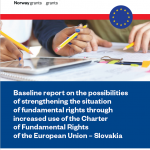
Baseline report on the possibilities of strengthening the situation of fundamental rights through increased use of the Charter of Fundamental Rights of the European Union – Slovakia (available for download – pdf, 450 KB)
The report focuses on the fundamental rights situation through an analysis of the implementation of the Charter by the judiciary, executive and legislative powers in Slovakia. It provides information on how the Charter should be used in law-making process and how it is actually used. In particular, the study focuses on the process of adopting new civil codes. It also examines the way in which national policies refer to the Charter, whether they directly implement the Charter or only make formal reference to it. In the area of the judiciary, the study specifically examines the use of the Charter by the courts of the general court system and by the Constitutional Court of the Slovak Republic through specific court decisions referring to the Charer. Finally, it presents examples of good practice from other EU Member States in the implementation of the Charter. Based on the findings, the study concludes with an identification of the potential for the application of the Charter and its possible benefits.
Baseline report on the possibilities of strengthening the situation of fundamental rights through increased use of the Charter of Fundamental Rights of the European Union – Slovakia (in Slovak language)

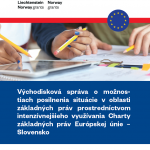 Východisková správa o možnostiach posilnenia situácie v oblasti základných práv prostredníctvom intenzívnejšieho využívania Charty základných práv Európskej únie – Slovensko (dostupné na stiahnutie – pdf, 526 KB)
Východisková správa o možnostiach posilnenia situácie v oblasti základných práv prostredníctvom intenzívnejšieho využívania Charty základných práv Európskej únie – Slovensko (dostupné na stiahnutie – pdf, 526 KB)
Správa sa zameriava na situáciu v oblasti základných práv prostredníctvom analýzy implementácie Charty súdnou, výkonnou a zákonodarnou mocou na Slovensku. Obsahuje informácie o spôsobe akým by sa Charta mala využívať pri tvorbe zákonov a aké je jej reálne využitie v tomto procese. Konkrétne sa sústredí na proces prijímania nových civilných kódexov. Taktiež analyzuje spôsob akým štátne politiky odkazujú na Chartu, či ju priamo implementujú alebo obsahujú iba formálny odkaz. V oblasti súdnej moci štúdia osobitne skúma využívanie Charty súdmi všeobecnej sústavy súdov a Ústavným súdom Slovenskej republiky prostredníctvom konkrétnych súdnych rozhodnutí, ktoré na Chartu nadväzujú. Na záver prináša príklady dobrej praxe z iných členských štátov EÚ pri implementácii Charty. Na základe zistení, štúdia v závere identifikuje potenciál pre uplatňovanie Charty a jej možný prínos.
The use of EU funds while respecting and promoting fundamental rights: A guide to applying the new EU Charter of Fundamental Rights conditionaly (guidance) – in Slovak language

 Využívanie finančných prostriedkov EÚ pri dodržiavaní a presadzovaní základných práv:
Využívanie finančných prostriedkov EÚ pri dodržiavaní a presadzovaní základných práv:
sprievodca uplatňovaním novej podmienenosti Chartou základných práv EÚ
(dostupné na stiahnutie – pdf, 5,22 MB)
The use of EU funds while respecting and promoting fundamental rights: A guide to applying the new EU Charter of Fundamental Rights conditionaly (guidance)

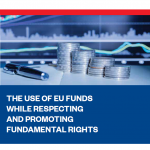 The use of EU funds while respecting and promoting fundamental rights:
The use of EU funds while respecting and promoting fundamental rights:
A guide to applying the new EU Charter of Fundamental Rights conditionaly (guidance)
(available for download – pdf, 479 KB)







